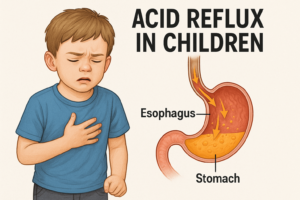
Acid reflux isn’t just an adult issue—it can also affect children, from infants to teenagers. Many parents worry when their child constantly complains of chest discomfort, refuses food, or has frequent hiccups. Understanding the symptoms of acid reflux in children and learning safe treatment options can help you manage this condition effectively and protect your child’s health.
What Is Acid Reflux in Children?
Acid reflux occurs when stomach acid flows back into the esophagus (the food pipe). In children, this happens when the lower esophageal sphincter (LES), a muscle that keeps stomach contents from moving upward, doesn’t function properly. Occasional reflux is normal, but frequent episodes may indicate GERD (Gastroesophageal Reflux Disease), a more serious form of reflux.
Symptoms of Acid Reflux in Children
Children may not always describe their symptoms clearly, so parents need to watch out for the following signs:
- Frequent vomiting or regurgitation after meals
- Burning sensation in the chest or throat (heartburn)
- Refusal to eat or poor appetite
- Chronic cough, sore throat, or hoarseness
- Bloating and frequent burping
- Bad breath despite oral care
- Poor weight gain or weight loss in severe cases
- Irritability in infants, especially after feeding
- Difficulty swallowing (feeling food stuck in the throat)
If these symptoms persist, it’s important to consult a gastroenterologist in Surat for proper evaluation and treatment.
Causes of Acid Reflux in Children
Several factors can contribute to acid reflux in children:
- Overeating or eating too quickly
- Consuming spicy, fried, or junk foods
- Lying down immediately after meals
- Obesity or being overweight
- Excessive intake of caffeine, chocolate, or sodas
- Certain medications (antibiotics, painkillers, etc.)
- Stress or anxiety
Safe Treatment Options for Acid Reflux in Children
1. Lifestyle and Home Remedies
Parents can start with simple lifestyle changes to reduce reflux:
- Encourage smaller, frequent meals instead of large ones.
- Avoid giving heavy or spicy foods close to bedtime.
- Keep children upright for at least 30 minutes after meals.
- Maintain a healthy weight through proper diet and physical activity.
- Elevate the head of the child’s bed slightly to prevent nighttime reflux.
2. Dietary Guidance
Diet plays a vital role in managing acid reflux.
Foods to Avoid:
- Spicy foods (chili, pickles)
- Fried and oily snacks
- Citrus fruits (oranges, lemons)
- Chocolates, caffeinated drinks, and carbonated sodas
- Tomato-based dishes
Foods to Include:
- Oatmeal and whole grains
- Bananas, apples, and pears
- Steamed vegetables like carrots, beans, and broccoli
- Low-fat dairy products
- Coconut water and herbal teas
3. Medical Treatment
If lifestyle and diet changes don’t help, doctors may prescribe medications. Common ones include:
- Antacids (for quick relief, short-term use)
- H2 Blockers (reduce acid production)
- Proton Pump Inhibitors (PPIs) (heal esophageal damage caused by acid)
Medication should always be given under the guidance of a pediatric gastro specialist.
4. Advanced Care
In severe GERD cases, where medications and lifestyle changes fail, further medical procedures may be needed. However, this is rare in children and usually considered only after thorough evaluation by one of the top 10 gastroenterologist in Surat.
When to See a Doctor Immediately
Parents should seek urgent medical attention if their child experiences:
- Severe chest pain or difficulty breathing
- Vomiting blood or passing black stools
- Persistent difficulty swallowing
- Unexplained weight loss
- Severe irritability in infants after feeding
Frequently Asked Questions (FAQs)
Q1: Can acid reflux in children go away on its own?
Yes, mild reflux in infants often improves as they grow older. But persistent symptoms in older children need medical attention.
Q2: Is acid reflux dangerous for kids?
Occasional reflux is harmless, but untreated chronic reflux (GERD) can damage the esophagus and cause long-term issues.
Q3: What foods help with acid reflux in children?
Bananas, oatmeal, steamed vegetables, apples, and yogurt are soothing options that reduce acid irritation.
Q4: Can stress cause acid reflux in kids?
Yes, emotional stress and anxiety can worsen acid reflux symptoms in children.
Q5: Should I give my child home remedies like cold milk or fennel seeds?
Mild remedies like cold milk may provide temporary relief, but always consult a doctor before using frequent home remedies, especially for younger children.
Conclusion
Acid reflux in children can be uncomfortable, but with the right care, it can be managed safely. By focusing on healthy eating habits, lifestyle adjustments, and medical guidance when necessary, parents can help their children live free from reflux-related discomfort.
If your child’s symptoms persist or worsen, it’s best to consult a pediatric gastro expert or a trusted gastroenterologist in Surat for proper diagnosis and long-term care. Early attention ensures better health and peace of mind for both children and parents.
